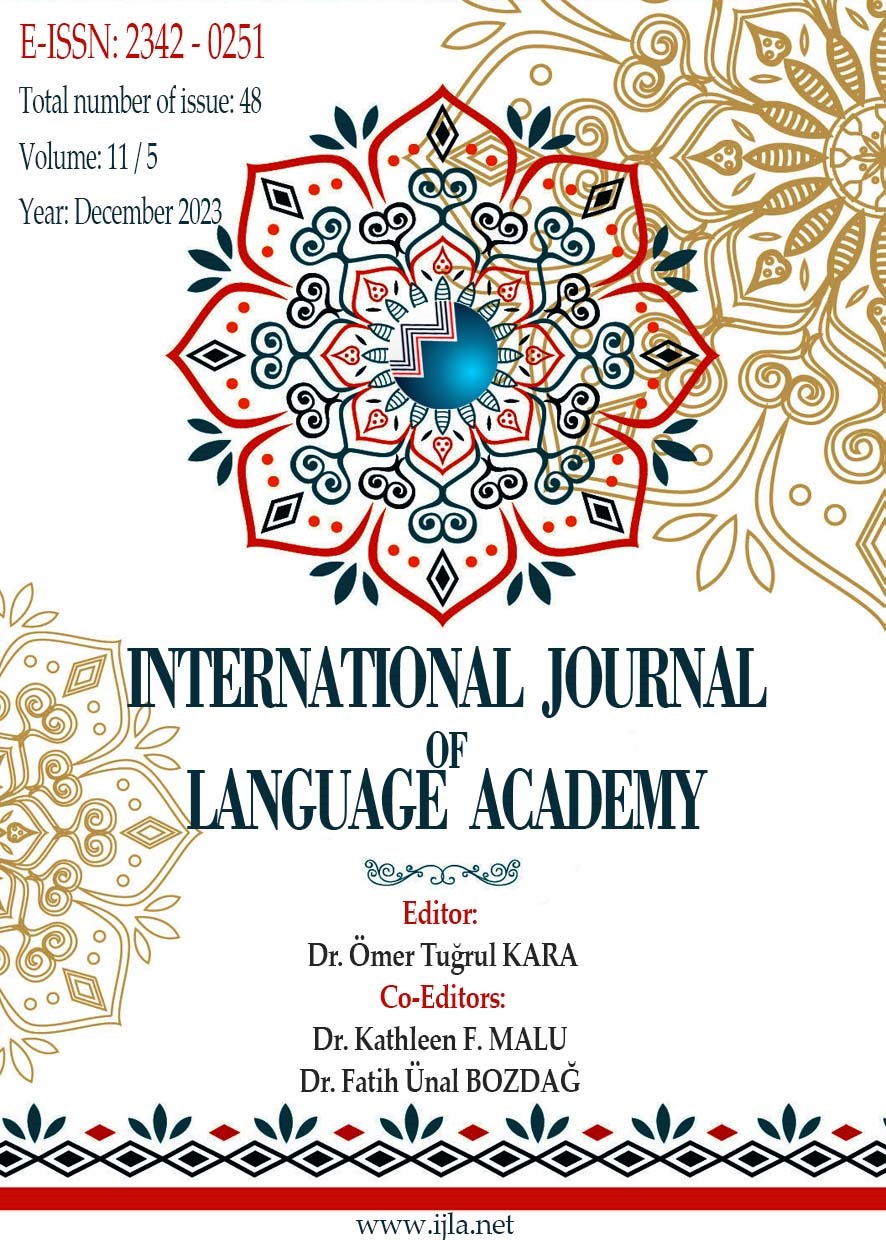Author :
Abstract
Araştırmanın amacı, virüs salgınının Türkçeye etkisini incelemek ve değerlendirmektir. Nicel araştırma yaklaşımına göre yürütülen araştırmada veriler, Virüs Salgınının Türkçeye Etkisi Anketi kullanılarak elde edilmiştir. Bu anket aracılığıyla katılımcıların, salgın terimlerini bilme durumları ile bu terimlere yönelik bilişsel ve duyuşsal farkındalıkları incelenmiştir. Toplumun değişik katmanlarında yer alan 745 katılımcı tarafından yanıtlanan anket; katılımcıların meslek grubu, yaş aralığı, eğitim durumu ve cinsiyet değişkenlerine göre Türkçe bilinci konusunda fikir vermektedir. Bu anketten elde edilen veriler, SPSS 25.0 programı ile çözümlenmiştir. Araştırmanın sonuçlarına göre Katılımcıların salgından önceki yaşantılarında duydukları kelimelerin Türkçe karşılıklarını bilme oranı, diğer cevaplara göre daha yüksek çıkmıştır. Virüs salgınıyla dilimize giren kelimelerin Türkçe karşılıklarının bilinme durumları incelendiğinde salgın öncesinde duyulan ve Türkçe karşılığı en çok bilinen üç kelime stabil, kronik, mutasyon; salgın sonrasında duyulan ve Türkçe karşılığı en çok bilinen üç kelime filyasyon, pandemi, varyant; salgın öncesinde duyulan ve Türkçe karşılıkları en çok bilinmeyen üç kelime dezenfektan, enfeksiyon, ventilatör; salgın sonrasında duyulan ve Türkçe karşılıkları en çok bilinmeyen üç kelime; pnömoni, dezenfektan, epidemi; katılımcıların hiç duymadığı üç kelime ise mortalite, vital bulgu ve immünitedir. Katılımcıların çoğunluğunun, bu kelimelerin Türkçe karşılıklarını kullanmayı tercih etmemekle birlikte anketten sonra çevrelerini bilgilendirme ve sonraki yaşantılarında Türkçe karşılıklarını kullanma yönünde yanıt bildirmeleri, araştırmanın dil bilinci oluşturmadaki rolünü göstermektedir.
Keywords
Abstract
The aim of the study is to examine and evaluate the effect of the virus outbreak on the Turkish language. In the study, which was conducted according to the quantitative research approach, data were obtained using the Effect of Virus Outbreak on Turkish Questionnaire. Through this questionnaire, participants' knowledge of epidemic terms and their cognitive and affective awareness of these terms were examined. The questionnaire, which was answered by 745 participants from different layers of the society, gives an idea about the participants’ awareness of the Turkish language according to the variables of job, age range, educational status,and gender. The data obtained from this questionnaire were analyzed through the SPSS 25.0 program. According to the research results, The rate of knowing the Turkish equivalents of the words they heard in their lives before the pandemic was higher than the other answers. When the Turkish equivalents of the words that have entered our language with the virus outbreak are examined, it is seen that the three words heard before the outbreak and whose Turkish equivalents are most known are stable, chronic, mutation; the three words heard after the outbreak and whose Turkish equivalents are most known are filiation, pandemic, variant;the three words heard before the pandemic and whose Turkish equivalents are mostly unknown are disinfectant, infection, ventilator; the three words heard after the pandemic and whose Turkish equivalents are mostly unknown arepneumonia, disinfectant, epidemic; and the three words that the participants have never heard are mortality, vital sign and immunity. The fact that the majority of the participants who hadnot preferred to use the Turkish equivalents of these words before the survey stated that they would inform their environment and use the Turkish equivalents in their future lives shows the role of the research in creating language awareness.
